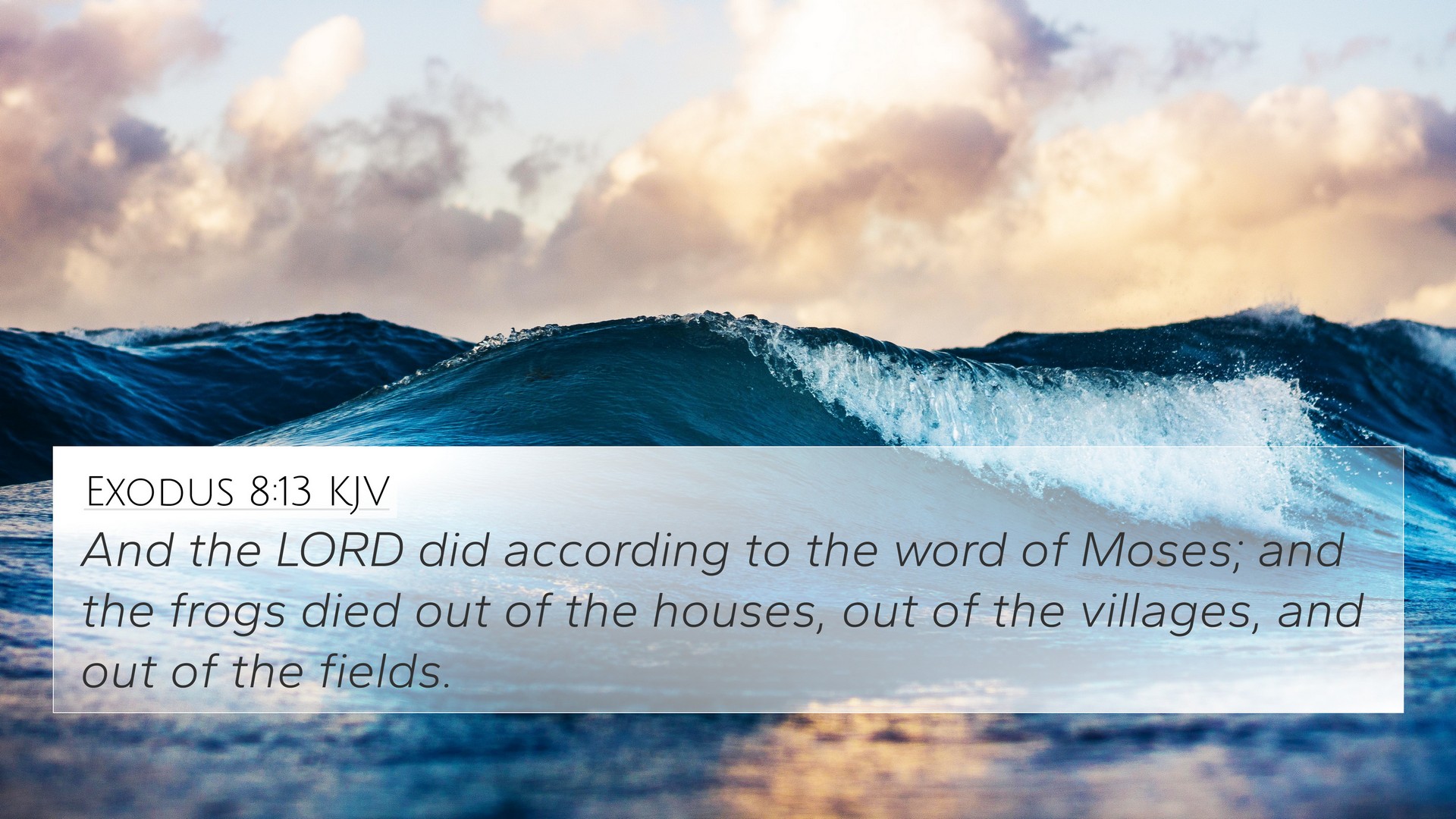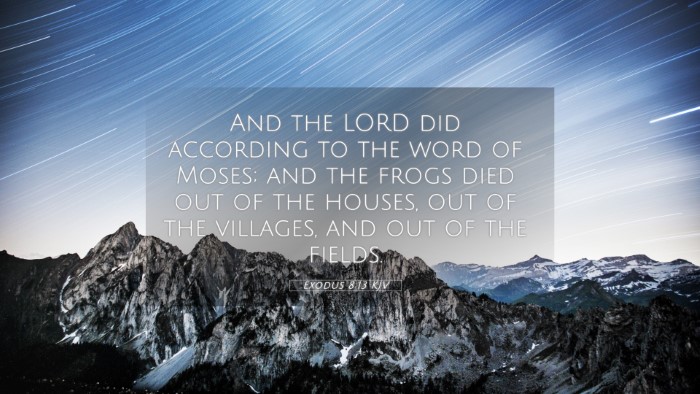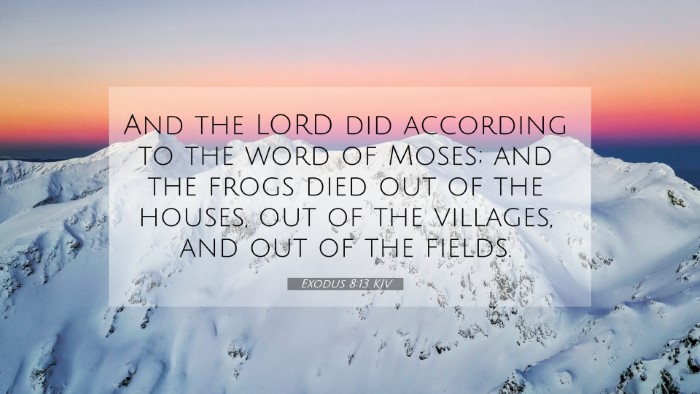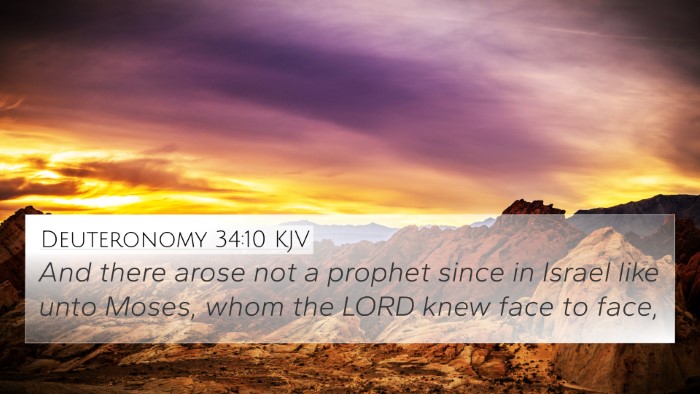Meaning and Interpretation of Exodus 8:13
Exodus 8:13 states: "And the LORD did according to the word of Moses; and he removed the swarms of flies from Pharaoh, from his servants, and from his people; there remained not one." This verse captures a pivotal moment in the Exodus narrative, showcasing God's sovereignty and the power of intercession.
Summary of Key Themes
- Divine Authority: The verse emphasizes God's authority as He responds to Moses' request, illustrating His active involvement in the affairs of humanity.
- Moses as Intercessor: Moses serves as an intermediary between God and Pharaoh, highlighting the role of intercession in prayer and supplication.
- Fulfillment of Promises: God's removal of the flies signifies His commitment to fulfill His promises to His people, further affirming His covenant relationship with Israel.
- Judgment and Mercy: The verse illustrates the delicate balance between God's judgment on Egypt and His mercy towards His chosen people.
- Importance of Faith: Moses’ faith in God's promise is paramount, encouraging believers to trust in divine intervention during times of distress.
Exegesis and Public Domain Commentary Insights
Matthew Henry: Henry notes that the removal of the flies represents God's power over natural processes and demonic forces. The swarms of flies symbolize chaos and disorder, and their removal signifies restoration and peace at God's command. Henry stresses Moses' role in seeking God's help, urging believers to pray earnestly in times of trouble.
Albert Barnes: Barnes highlights that this event serves as a testament to God’s willingness to listen to the cries of His people. He emphasizes the significance of God's action—removing every single fly—demonstrating His omnipotence and precision. This deliberate act encourages believers to have confidence in God's ability to deliver them completely from their troubles.
Adam Clarke: Clarke elaborates on the symbolism of the flies as pests that brought suffering. He views this passage as a portrayal of God’s mercy interceding in judgment. Clarke also reflects on the nature of Pharaoh's obstinacy and how despite experiencing miracles, his heart remained hardened, which serves as a warning for individuals not to ignore divine signs.
Bible Verse Cross-References
Exploring cross-references provides deeper understanding. Here are some related scripture passages:
- Exodus 5:1: The initial confrontation where Moses speaks to Pharaoh about releasing Israel.
- Exodus 7:17: God's assurance of bringing plagues upon Egypt to demonstrate His sovereignty.
- Exodus 8:1: God's command to Moses to demand Pharaoh to let His people go.
- Exodus 10:21-22: A reference to another plague that shows God's ability to darken Egypt, showing His power over creation.
- Psalm 78:45: A reminder of God's plagues upon Egypt and how they served as signs of His might.
- Revelation 16:2: The plagues in the New Testament echoing the calamities of Egypt, demonstrating God's ongoing judgment.
- Isaiah 19:25: Reference to God’s people, suggesting a future restoration linked to God’s mercy as seen in Exodus.
Thematic Connections and Biblical Ties
This verse serves as a connection point between various Biblical themes:
- Intercession: Connection with other intercessory prayers in scripture, such as those by Abraham (Genesis 18:20-33) and Jesus (Luke 22:32).
- Divine Judgments: Links to themes of divine intervention in the lives of God's people, reminiscent of the plagues’ narratives throughout the Bible.
- Deliverance: Exodus 14:13-14, where God’s deliverance is promised, echoing throughout the story of Israel’s exodus.
- God’s Sovereignty: Continues into New Testament theology, particularly in Romans 8:28, where all things work together for good.
Conclusion
Understanding Exodus 8:13 provides a snapshot of God's nature, His merciful responses to prayers, and the importance of faith. Through Moses, we see the vital practice of intercessory prayer and the point at which God's power meets human need. This passage, enriched by comparative Bible verse analysis and linking Bible scriptures, invites believers to explore the deep and abiding connections within the entire Biblical narrative.



